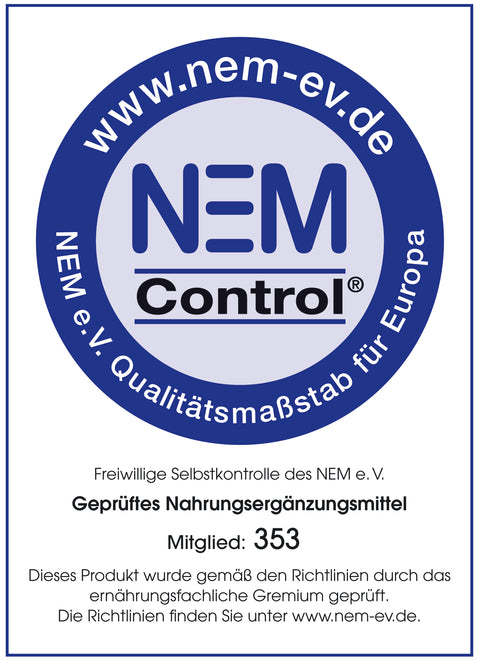What is Vitamin C?
Vitamin C is an essential vitamin that our body cannot produce itself and must therefore be obtained from food.
It is an antioxidant that helps our body prevent cell damage and supports the immune system. However, there is debate as to whether it is better to get a vitamin C supplement from a natural source or an artificial one.
Now you can find a lot of different preparations at different prices and, above all, dosages in the supermarket or in the pharmacy. How is one supposed to see through that?
How Much Vitamin C Do Humans Metabolize?
The amount of vitamin C that the human body can metabolize in an hour depends on several factors, such as a person's age, gender, weight, general health and dietary habits.
In general, however, the body can only absorb and metabolize limited amounts of vitamin C at a time. This is because the body has limited amounts of transport molecules that can transport vitamin C through the intestinal wall and into the bloodstream.
Most studies indicate that with a single oral intake of vitamin C doses of up to 200-250 mg, the body is able to absorb and utilize between 70-90% of the vitamin. However, doses higher than 500-1000 mg are less effectively absorbed and can result in excess vitamin C being excreted.
It's also important to note that vitamin C is a water-soluble vitamin, meaning excess amounts can be excreted when not needed by the body.
What foods contain vitamin C?
Natural vitamin C is found in many types of fruit and vegetables, such as oranges, grapefruits, kiwis, papayas, broccoli, peppers and many more. Not only do these foods contain vitamin C, but they also contain other nutrients such as fiber, antioxidants, and other vitamins and minerals, all of which help maintain good health.
How is vitamin C obtained from the acerola cherry?
The acerola cherry is a natural source of vitamin C and is commonly used in the manufacture of dietary supplements. The extract is obtained from the pulp of the acerola cherry, which is usually processed into a powder or juice concentrate.
There are several methods to obtain the vitamin C-rich extract from the acerola cherry. A common method is freeze drying, in which the pulp is first frozen and then dried under vacuum. This sublimates the water in the pulp in the form of ice, leaving the dried fruit powder behind.
The Blueantox Vitamin C + E is a dietary supplement containing vitamin C and vitamin E. Vitamin E is another antioxidant found in many foods that our bodies need to prevent cell damage. It is believed that vitamin E may also help improve the absorption of vitamin C.
However, vitamin C and vitamin E are both fat-soluble, meaning they are best taken with high-fat foods for optimal absorption. Therefore, the Blueantox Vitamin C + E could be particularly useful when taken with a meal that contains sufficient fat.
Why no artificial vitamin C supplements?
Artificial vitamin C supplements are often synthetically made and can be taken in higher doses than natural sources. However, there is debate as to whether synthetic vitamin C is as effective as natural vitamin C. There are some studies that suggest that natural sources of vitamin C may be better absorbed in the body than synthetic vitamin C due to their combination with other nutrients.
Overall, however, it's best to get vitamin C from natural sources to get the full benefit of other nutrients and ensure our bodies can optimally absorb and utilize the vitamin C. However, if you are struggling to get enough vitamin C from your diet or need extra support, a dietary supplement such as Blueantox Vitamin C + E can be a good option to meet your needs. However, it's always a good idea to check with your doctor or nutritionist before taking any supplements to make sure they're right for you.
What problems does vitamin C solve?
Regular intake of vitamin C can help solve or prevent various health problems. Here are some of the key benefits of vitamin C:
-
Immune System Support: Vitamin C plays an important role in supporting the immune system and may help fight infection and disease.
-
Antioxidant Action: Vitamin C is an antioxidant that can help fight free radicals in the body and protect cells from damage.
-
Improve Cardiovascular Health: Studies have shown that vitamin C can help lower blood pressure, reduce the risk of heart disease, and improve blood flow.
-
Improve Skin Health: Vitamin C is an important nutrient for skin health as it can help increase collagen production and protect skin from damage caused by UV rays and pollution.
-
Supporting Brain Health: Vitamin C may help improve brain health and reduce the risk of neurodegenerative diseases like Alzheimer's and Parkinson's.
-
Improving Iron Absorption: Vitamin C can improve the absorption of iron from plant sources and help prevent anemia and other iron deficiency-related diseases.
It's important to note that a balanced diet with a variety of fruits and vegetables is the best source of vitamin C.









